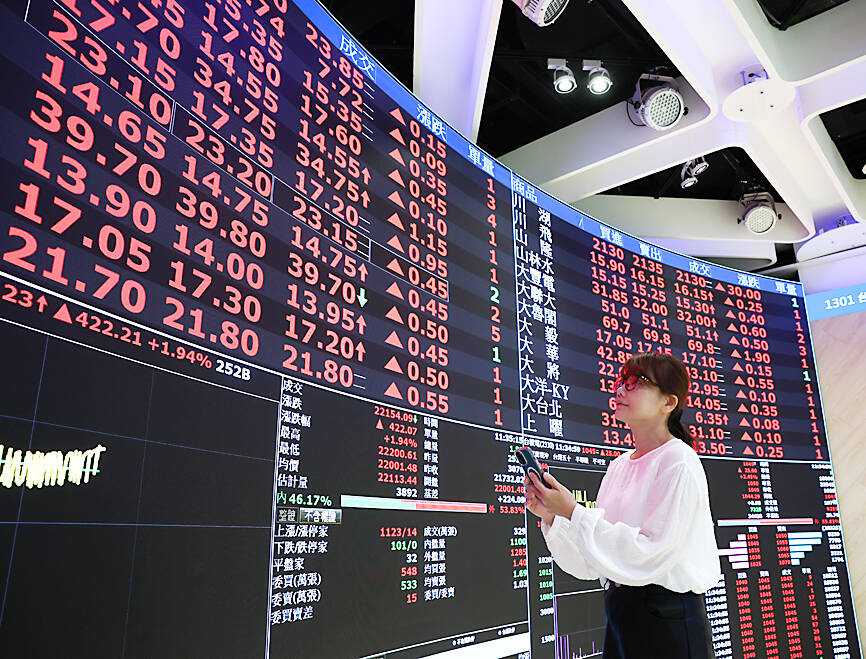The National Stabilization Fund (NSF, 國安基金) is to continue supporting local shares, as uncertainties in international politics and the economy could affect Taiwanese industries’ global deployment and corporate profits, as well as affect stock movement and investor confidence, the Ministry of Finance said in a statement yesterday.
The NT$500 billion (US$17.1 billion) fund would remain active in the stock market as the US’ tariff measures have not yet been fully finalized, which would drive international capital flows and global supply chain restructuring, the ministry said after the a meeting of the fund’s steering committee.
Along with ongoing geopolitical risks and an unfavorable global economic outlook, the committee allowed the fund to continue its market interventions to maintain investor confidence and capital market stability, the ministry said.

Photo: CNA
The NSF’s steering committee operates under the Ministry of Finance. As permitted under Article 8 of the Act for the Establishment and Administration of the National Stabilization Fund (國家金融安定基金設置及管理條例), the fund intervenes whenever major domestic or international events trigger large movements of international funds, significantly affect public confidence or lead to disorder in the capital and financial markets in Taiwan.
The committee on April 8 activated the fund to shore up the local market amid panic sell-offs triggered by US President Donald Trump’s sweeping tariff announcement on April 2.
The NSF helped support the local market and shore up investor confidence, with the TAIEX surging 4,155.02 points, or 22.51 percent, from April 9 to yesterday, the ministry said.
Although Taiwan outperformed markets in Hong Kong, Tokyo and Shanghai over the same period, in the US, the Philadelphia Stock Exchange Semiconductor Index soared 59.88 percent, the NASDAQ Composite Index gained 34.82 percent and the S&P 500 increased 25.63 percent, while South Korean equities rose 37.02 percent, the ministry said.
According to the latest financial report released by the steering committee, the NSF invested more than NT$7.7 billion between April 9 and June 30. It recorded NT$1.183 billion in unrealized gains and over NT$43.16 million in dividend receivables.
The TAIEX yesterday closed down 136.06 points, or 0.6 percent, at 22,614.97 as investors remained concerned about Trump’s tariff policies after the US president announced a 30 percent levy on imports from the EU and Mexico over the weekend.
Additional reporting by CNA

WEAKER ACTIVITY: The sharpest deterioration was seen in the electronics and optical components sector, with the production index falling 13.2 points to 44.5 Taiwan’s manufacturing sector last month contracted for a second consecutive month, with the purchasing managers’ index (PMI) slipping to 48, reflecting ongoing caution over trade uncertainties, the Chung-Hua Institution for Economic Research (CIER, 中華經濟研究院) said yesterday. The decline reflects growing caution among companies amid uncertainty surrounding US tariffs, semiconductor duties and automotive import levies, and it is also likely linked to fading front-loading activity, CIER president Lien Hsien-ming (連賢明) said. “Some clients have started shifting orders to Southeast Asian countries where tariff regimes are already clear,” Lien told a news conference. Firms across the supply chain are also lowering stock levels to mitigate

Six Taiwanese companies, including contract chipmaker Taiwan Semiconductor Manufacturing Co (TSMC, 台積電), made the 2025 Fortune Global 500 list of the world’s largest firms by revenue. In a report published by New York-based Fortune magazine on Tuesday, Hon Hai Precision Industry Co (鴻海精密), also known as Foxconn Technology Group (富士康科技集團), ranked highest among Taiwanese firms, placing 28th with revenue of US$213.69 billion. Up 60 spots from last year, TSMC rose to No. 126 with US$90.16 billion in revenue, followed by Quanta Computer Inc (廣達) at 348th, Pegatron Corp (和碩) at 461st, CPC Corp, Taiwan (台灣中油) at 494th and Wistron Corp (緯創) at

NEGOTIATIONS: Semiconductors play an outsized role in Taiwan’s industrial and economic development and are a major driver of the Taiwan-US trade imbalance With US President Donald Trump threatening to impose tariffs on semiconductors, Taiwan is expected to face a significant challenge, as information and communications technology (ICT) products account for more than 70 percent of its exports to the US, Chung-Hua Institution for Economic Research (CIER, 中華經濟研究院) president Lien Hsien-ming (連賢明) said on Friday. Compared with other countries, semiconductors play a disproportionately large role in Taiwan’s industrial and economic development, Lien said. As the sixth-largest contributor to the US trade deficit, Taiwan recorded a US$73.9 billion trade surplus with the US last year — up from US$47.8 billion in 2023 — driven by strong

ASE Technology Holding Co (ASE, 日月光投控), the world’s biggest chip assembly and testing service provider, yesterday said it would boost equipment capital expenditure by up to 16 percent for this year to cope with strong customer demand for artificial intelligence (AI) applications. Aside from AI, a growing demand for semiconductors used in the automotive and industrial sectors is to drive ASE’s capacity next year, the Kaohsiung-based company said. “We do see the disparity between AI and other general sectors, and that pretty much aligns the scenario in the first half of this year,” ASE chief operating officer Tien Wu (吳田玉) told an